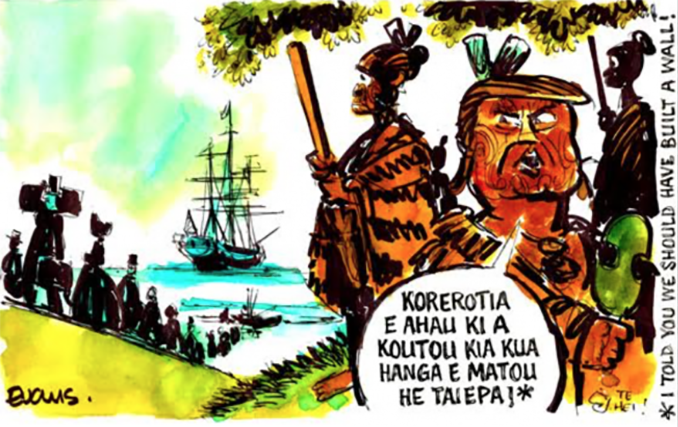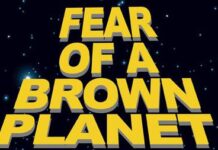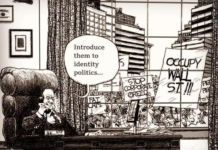I was delighted that the teaching of the history of Aotearoa is to become compulsory in schools. There will need to be some good work done to develop the mahi. Also the history of our history – how contested it has been, the racial and wealth divides, the taking of the land, the destruction of whānau and whenua – are all topics that will need to be covered. Like many colonised countries, there is a need to move from the history of the victors to the history of the entire nation.
Fortunately, we have excellent history teachers and fantastic historians, Māori and Pākeha, that can write the curricula that will be needed. I hope it will boost a whole new generation of historians.
But where was the accompanying announcement that te reo Māori would also become compulsory in all schools? And our third language, NZ Sign Language? Just as we need to teach and care for our history, our languages need to be taught and examined. Language is the gateway to culture and understanding, and universal te reo is sorely needed.
I do understand why this would be more controversial, but the fact that it is controversial also shows that it is so needed. We need to mature faster as a nation in terms of these steps, to prevent the divisions that exist from taking hold further.
I have enjoyed Māori language week, but believe that every week should celebrate te reo Māori, our indigenous language.
Dr Liz Gordon is a researcher and a barrister, with interests in destroying neo-liberalism in all its forms and moving towards a socially just society. She usually blogs on justice, social welfare and education topics.






With 80% of the prison population not able to read or write we should get this sorted before compulsory learning te reo. It is a good aspiration but are there enough fluent teachers and who will decide which tribes laugage will be taught
The good Dr obviously doesn’t understand what multiculturalism means, I know what it means to me and it may not be her understanding of it, after all, this is a free country, despite what people like the Dr thinks.
It’s great that children learn their nations history in school. I had history lessons in school in the UK until I was 14 but then went into the science & maths stream (I stopped at Henry VIII) and it gave me a good grounding in where and who I was.
However the devil is in the detail. Exactly whose version of history is to be taught?
Will they teach children the uncomfortable facts about Maori prior to colonization so as to give balance to what happened after? I can just imagine the uproar in Maoridom when their kids are informed that their ancestors were mesolithic cannibals prior to European settlement. Some detailed accounts of inter-tribal warfare as recorded by early settlers and Maori themselves will require the services of a trauma counselor. 😉
Will they teach the Treaty as it was written and intended or will they teach the new, embellished version that the grievance industry employs?
Who will write the syllabus? I hope not one of the many ideologically driven academics that lurk in our universities.
It’s a great idea but fraught with problems.
“Also the history of our history – how contested it has been, the racial and wealth divides, the taking of the land, the destruction of whānau and whenua – are all topics that will need to be covered.”
Let’s hope that the coverage is clear-eyed. I’m not particularly hopeful, if this is anything to go by:
https://www.rnz.co.nz/news/te-manu-korihi/398912/captain-cook-replica-banned-from-docking-in-mangonui-during-commemoration
“”Cook never came into our rohe, he sailed by, and apparently cast his eye to the port and said, ‘oh, that’s Doubtless Bay.’ It’s a fiction for him to ‘re-visit’ us because he never came””
That’s not how Doubtless Bay got its name.
“”He was a barbarian. Wherever he went, like most people of the time of imperial expansion, there were murders, there were abductions, there were rapes, and just a lot of bad outcomes for the indigenous people.”
So: history as name-calling, is that it? The commentator needs to be careful, chucking that epithet around. Cook was most certainly not a barbarian: to suggest that he was, is deeply offensive to many of us, of whose heritage he was an integral part. He was – by any definition – the apotheosis of a civilised man, clever, well-educated and a superb mariner.
I’d add that, had it not been for Cook giving pigs (Captain Cookers, remember?), goats and chickens to the Maori – or had 18th century European explorers never arrived here, bringing the potato, cabbage and carrot – diminishing food resources would have brought about either a large-scale population crash, or even extinction of the Maori people. See this:
https://royalsocietypublishing.org/doi/full/10.1098/rsos.160258
Abductions, rapes, murders: what, over and above what was already happening here with existing inter-tribal conflict? Of course there would be tensions and violence, where two wildly different cultures clash. No surprises there.
“…..seek an apology for the atrocities brought upon their people when Captain Cook arrived on their shores.”
Atrocities? What atrocities would those be? Because NZ history has always interested me, I’ve read a good deal of it. I’m well aware of the worst events that happened in our shared past. But I’d like to know about the atrocities inflicted by Cook or his sailors: that’s news to me.
Much of what’s been broadcast here in NZ in recent times – including some of the above piece – makes 18th and 19th century Maori out to be more passive than they actually were; they had agency, and were much more active participants in the life of the times than contemporary commentators evidently want to believe.
“….where was the accompanying announcement that te reo Māori would also become compulsory in all schools? And our third language, NZ Sign Language.”
Compulsory teaching – even were it the case that there were enough competent teachers – is pointless. Ask the Irish; and the Welsh. Compulsion of that sort won’t save either language.
In this country, we’ve had Maori Language Week since 1975 (Maori Language Day since 1972), and in that time, te reo has fallen off a cliff. The kohanga reo system was established in 1982, but it hasn’t been any more efficacious, either.
The focus is wrong: Maori need to pay attention to what their elders were saying 100 years ago: speak the language to your babies, so that it’s the first and only language they hear and learn to speak as their first language. This is the definition of a native speaker: for survival, every language needs native speakers. This isn’t peculiar to te reo.
In the almost-50 years since I learned te reo, the decline in native speakers has been catastrophic. It’s very difficult to obtain accurate stats, but nowadays, it looks as if there are no native speakers remaining, or if there are any, their numbers are too few for language revival. A language without native speakers is classified as dead. Bilingualism won’t do it, I suspect, if the language survival is at such a crisis point.
We’d know that revival efforts were successful, if a significant number of Maori 5-year-olds, fluent in te reo, but unable to speak English, were to turn up to our schools. I’ve heard nothing to suggest that’s happening. Requiring non-Maori – whose native language is English or some other language – to learn te reo, is a waste of resources. No matter how keen they might be, they’d still be second-language learners. It is up to Maori to rescue their language: it’s their heritage, after all. And they have – have always had – the tools for doing so. Formal education in te reo isn’t critical. Or even necessary.
With regard to the issue of the native speaker: a family member is a native speaker of a language other than English. Said family member is of advanced years, came here as a small child, has spoken English (and when younger, also the native language) ever since. When we return to the country where my family member was born, it’s a miracle to hear: they sound exactly the same as everybody there, even though they’ve spoken English for many decades. And the language returns, even though their vocab. is a bit limited and some aspects of their usage hark back to the past.
This would be a different country altogether, were te reo Maori to be revived.
Comments are closed.